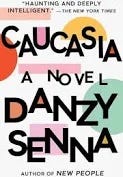Hello, everyone! And thank you to new people signing on to read Cover Your Bases. This newsletter is a blend of AI and tech tips and ideas, plus bits of my other interests: reading, cooking, hiking, weightlifting, and getting through the next four years feeling strong, resilient, and able to push back against a cruel and rapacious regime.
This week, there is a lot of AI information and more good things to read.
New Blog Series: AI as a Nonprofit Force Multiplier
Following my presentation at the Jewish Digital Summit, I created a four-part blog series that breaks down practical approaches to implementing AI for nonprofit leaders. Whether you're just getting started or aiming to enhance your AI strategy to the next level, these articles provide actionable guidance based on my real-world experience.
Just published: Getting Started with AI for Nonprofits.
A beginner-friendly guide covering essential tools, initial implementation steps, and addressing common concerns about AI adoption. Perfect for organizations just starting their AI journey.
ALSO:
Building Custom AI Tools for Your Nonprofit - Learn how to create specialized AI assistants that understand your organization's unique voice, programs, and goals.
Strategic AI Implementation for Mission Growth - Move beyond individual experimentation to develop an organization-wide AI strategy that amplifies your mission.
Case Study: How I Use AI to Scale Nonprofit Impact - An inside look at my AI workflows for grant development, content creation, and relationship management.
Each article includes practical examples, implementation tips, and immediate steps.
Have questions about AI implementation or topics you'd like to see covered in future articles? Let me know, please.
Beyond the Algorithm: What Humanities Scholars Can Teach Us About AI
How do humanities scholars view the intersection of AI with human creativity and knowledge production? This recent draft paper, "Provocations from the Humanities for Generative AI Research," written by a team of humanities scholars led by Lauren Klein from Emory University, provides a framework for understanding AI that computer scientists and engineers–along with the rest of us– will find well worth a read.
RECENT GOOD READS (We need them now.)
Danzy Senna’s Colored Television and Caucasia: Two Novels That Cut to the Bone


Danzy Senna has a way of writing that gets under your skin—in the best way possible. Her latest novel, Colored Television, takes a sharp look at race, media, and identity, tackling how nostalgia and cultural memory shape (or distort) who we think we are. It’s full of dark humor and razor-sharp commentary, the kind of book that makes you laugh until you realize you’re wincing.
And then there’s Caucasia, the novel that introduced me to Senna’s work. This coming-of-age story, set in the ‘70s, follows Birdie, a mixed-race girl who passes as white when her family splits apart. It’s a novel about code-switching, survival, and the loneliness of not fully belonging anywhere.
Both books explore race and privilege in America in ways that feel as urgent now as ever. If you like your fiction smart, provocative, and unafraid to challenge the narratives we take for granted, put these on your list. Have you read them? Let’s talk.
Geraldine Brooks’ Memorial Days: A Story of War, Memory, and What Gets Left Behind
Geraldine Brooks has a way of making history feel close, personal—even when it’s uncomfortable. Memorial Days follows a woman piecing together the past, reckoning with grief, war, and the stories we inherit. It’s about memory—what we hold onto, what fades, and what gets rewritten along the way.
Brooks digs into the mess of history—the weight of history, the contradictions of honor and loss, the way we struggle to separate truth from myth. The result is a quiet but powerful novel that asks us to remember and think about how and why we do. It is not a light read, but it is a worthwhile one.
Sarah J. Maas’ Throne of Glass: Fantasy with Bite
Throne of Glass kicks off one of those sprawling fantasy series that pulls people in and doesn’t let go. Sarah J. Maas gives us Celaena Sardothien—an assassin with a sharp blade and a sharper ego—who’s dragged from prison to fight for her freedom in a deadly competition. There’s court intrigue, magic creeping into the world, and enough betrayal to keep things interesting.
This book leans hard into the tropes of tough heroine, love triangle, hidden destiny—but it’s fun watching Maas lay the groundwork for the epic chaos to come. This is a solid ride if you’re into fast-paced fantasy with a side of romance and rebellion.
Help! Whom Can I Escape-Read Now That I’ve Gone Through Elin Hilderbrand?
I have now read every Elin Hilderbrand novel available in the Libby library app across four libraries, roughly 34 books (plus a couple of Amazon short stories). I got hooked on this romance writer last summer, during the elections, and she became my escape pod. Who can I read now who is at this level of quality, a great escape, and has many books (Yes, I have also read every Jennifer Weiner novel ever published.) Suggestions needed.
Thanks for reading, I appreciate you.
Warmly,
Susan
PS Since you made it this far: Watch The Wild Robot, what a gorgeous movie!






